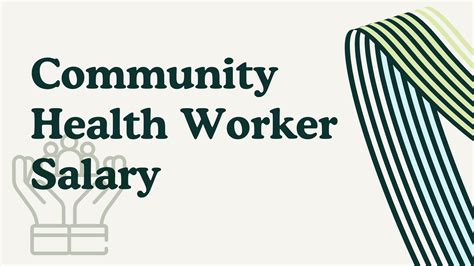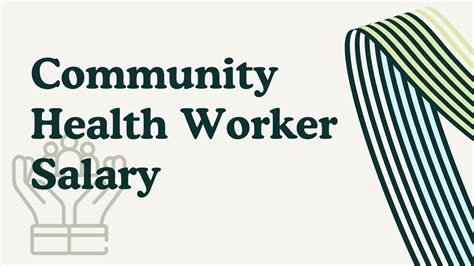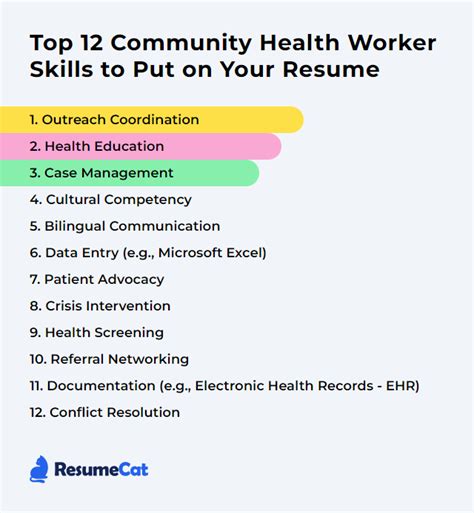Intro
The role of community health workers (CHWs) has become increasingly important in the healthcare industry, as they play a vital part in bridging the gap between healthcare providers and the communities they serve. With the growing demand for CHWs, it's essential to understand the average salary and job outlook for these professionals.

Community health workers are frontline public health workers who have a deep understanding of the communities they serve. They work to identify and address health disparities, provide education on healthy behaviors, and connect individuals with healthcare services. CHWs often work in underserved communities, where access to healthcare is limited, and play a critical role in improving health outcomes.
Community Health Worker Salary: Average Pay
The average salary for community health workers varies depending on factors such as location, employer, level of experience, and specific job duties. According to the Bureau of Labor Statistics (BLS), the median annual salary for community health workers was $43,600 in May 2020. However, salaries can range from around $25,000 to over $60,000 per year.
Here are some average salary ranges for community health workers in different industries:
- Government agencies: $40,000 - $55,000 per year
- Non-profit organizations: $35,000 - $50,000 per year
- Hospitals and healthcare systems: $45,000 - $60,000 per year
- Community health centers: $38,000 - $52,000 per year

Job Outlook for Community Health Workers
The job outlook for community health workers is promising, with the BLS projecting a 13% growth in employment opportunities from 2020 to 2030. This growth is faster than the average for all occupations and is driven by the increasing demand for healthcare services, particularly in underserved communities.
Factors contributing to the growth in CHW employment include:
- Aging population: The aging population will require more healthcare services, including those provided by CHWs.
- Healthcare reform: The Affordable Care Act and other healthcare reforms have increased access to healthcare, creating a greater need for CHWs to connect individuals with healthcare services.
- Focus on prevention: The healthcare industry is shifting its focus from treatment to prevention, and CHWs play a critical role in this effort.
Skills and Qualifications for Community Health Workers
To be successful as a community health worker, individuals should possess certain skills and qualifications, including:
- Cultural competence: CHWs must be able to understand and respect the cultural differences of the communities they serve.
- Communication skills: Effective communication is critical for CHWs, who must be able to connect with individuals from diverse backgrounds.
- Knowledge of health disparities: CHWs should have a deep understanding of the health disparities that exist in the communities they serve.
- Ability to work independently: CHWs often work independently, so they must be able to manage their time and prioritize tasks effectively.

Education and Training for Community Health Workers
While a formal education is not always required to become a community health worker, many employers prefer candidates with a post-secondary certificate or degree in a field such as public health, health education, or social work.
Some common education and training programs for CHWs include:
- Certificate programs: Many community colleges and universities offer certificate programs in community health work.
- Associate's degree programs: Some colleges offer associate's degree programs in community health work or related fields.
- Bachelor's degree programs: A bachelor's degree in a field such as public health or health education can be beneficial for CHWs who want to advance their careers.
Conclusion
The role of community health workers is critical in bridging the gap between healthcare providers and the communities they serve. With the growing demand for CHWs, it's essential to understand the average salary and job outlook for these professionals. By possessing the necessary skills and qualifications, completing education and training programs, and staying up-to-date on industry trends, CHWs can have a rewarding and challenging career in this field.
We invite you to share your thoughts on the role of community health workers in the comments section below. What do you think are the most critical skills and qualifications for CHWs? How can we support the growth and development of CHWs in the healthcare industry?
What is the average salary for community health workers?
+The average salary for community health workers varies depending on factors such as location, employer, and level of experience. According to the Bureau of Labor Statistics, the median annual salary for community health workers was $43,600 in May 2020.
What is the job outlook for community health workers?
+The job outlook for community health workers is promising, with the BLS projecting a 13% growth in employment opportunities from 2020 to 2030.
What skills and qualifications are required to be a successful community health worker?
+To be successful as a community health worker, individuals should possess skills such as cultural competence, communication skills, and knowledge of health disparities. They should also be able to work independently and prioritize tasks effectively.
